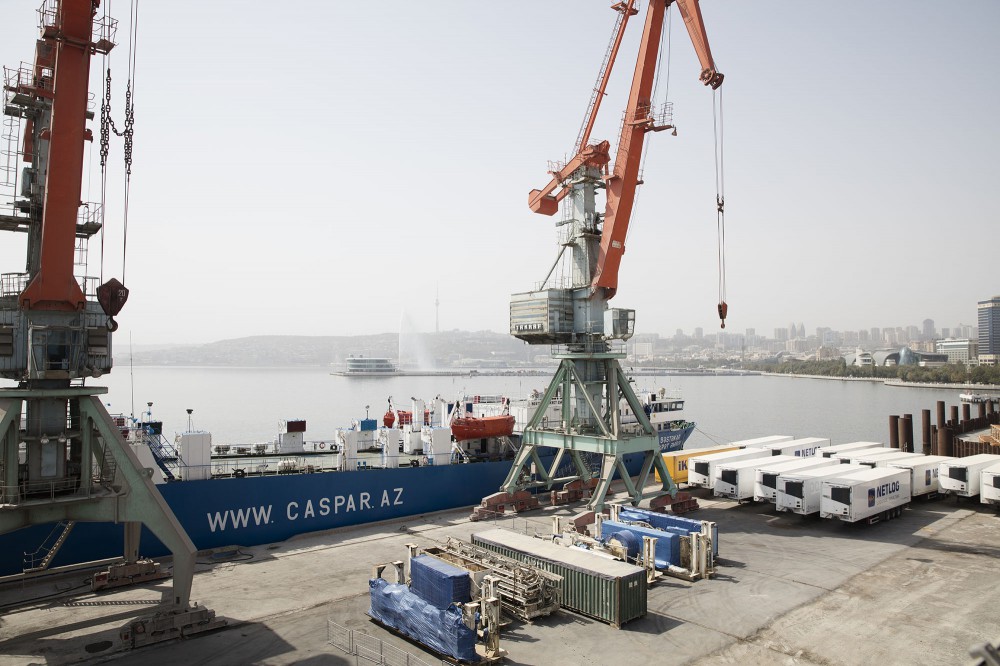Baku may become a regional distribution center for China’s transcontinental trade mega-project known as “One Belt, One Road” (OBOR), a revival of and modern twist to Asia’s ancient and famed Silk Road.
In a meeting with the Azerbaijani Railway Closed Joint Stock Company (CJSC) executive board in Baku last week, Kong Guohua, Deputy General Director at the Department of Commerce of Ningxia Hui Autonomous Region of China, revealed China’s interest in including the transport-logistics potential of Azerbaijan into OBOR, Azerbaijan Railways CJSC’s official website reported.
“Azerbaijan could contribute significantly to the realization of the Silk Road Economic Belt initiative. Routes that run through Azerbaijan have the greatest economic potential,” head of the Azerbaijan Railways CJSC Javid Gurbanov said at the meeting.
The parties signed a protocol as a result of the meeting, which will allow China to use the new Baku International Sea and Trade Port, also called the Port of Baku, as a regional distribution center within the Silk Road Economic Belt (SREB) project. SREB is a modern logistics network for transporting cargo to and from China through the Caspian Sea to Iran, Turkey and westward to Europe.
The Port of Baku is located about 70 kilometers (43 miles) south of Azerbaijan’s capital city and is a state-of-the-art seaport complex. Special free trade zones are being created in cooperation with international terminal operators and logistics companies, including DP World from the United Arab Emirates and the Dutch company APM Terminals. Port of Baku operators say the zones are the most advanced of their kind in the Caspian, fully equipped with the latest technologies and regulations brought in line with international maritime trade standards.
The 8,400 km-long SREB project is one of the major components of OBOR, alongside the oceanic Maritime Silk Road initiative, both which are aimed at increasing and accelerating cross-continental trade, stretching from China to Europe. Road and rail lines forming the project start in China’s eastern Xi'an region and reach Europe via Iran, Turkey and Russia.
Kazakhstan, located on the eastern shore of the Caspian Sea, will be home to the longest section of the project in the Central Asia and Caspian regions, totaling 2,800 kilometers and extending into Russia for an additional 2,200 kilometers.
If joined to the SREB project, the Port of Baku, a seaport similar to Jebel Ali port in Dubai, will contribute OBOR via its free trade zones, ferry rail terminals, cargo quays, service berth and roll-on, roll-off quays.
As a result Azerbaijan will become part of the modern world’s most ambitious trade and economic project, considered the brainchild of Chinese President Xi Jinping, who announced the idea in 2013 in Kazakhstan. The project encompasses countries containing 4.4 billion people in more than 60 countries, or more than 58 percent of the world’s population, and $21 trillion in gross domestic product.
“No other Caspian port city possesses a modern free trade zone that is built in line with international standards and practices like that of Port of Baku,” a representative from the Port of Baku, who preferred to remain unidentified, told Caspian News. “Experts are considering our port because it is, by far, the most developed in the Caspian region.”
According to the representative by the end of this year construction of the port’s first of three phases will be finished, allowing up to eleven cargo ships to dock simultaneously.
“Currently we are able to receive only two ships simultaneously and only up to six ships per day. We’re planning to accommodate as high as 25 million tons of cargo and one million containers per year at the Port of Baku,” the representative said.
As one of five countries surrounding the Caspian Sea and at the heart of the South Caucasus, Azerbaijan stands at the crossroads of major air, sea, rail and road routes within Eurasia, including the Trans-Caspian International Transport Route (TITR), the North-South and East-West routes, and the Baku-Tbilisi-Kars (BTK) railway.
TITR serves to transport goods to European consumers via Azerbaijan, Kazakhstan, Georgia, Turkey and Ukraine. The 826 km-long BTK railway comprises a part of TITR, running through Azerbaijan, Georgia and Turkey, where it connects to a broader rail network in Europe. The route decreases transportation to Europe from China by 12-15 days, down from the 25-30 days currently required.
The North-South and East-West routes bridge Asia and Europe in two completely different directions. North-South connects India via Iran, Azerbaijan and Russia to northern Europe, particularly Finland, while the East-West route links Lisbon, Portugal to China’s southern Qinzhou city and stretches across Central Asia, the Caspian Sea, Azerbaijan, Georgia and Turkey.
“A number of important transport projects are being implemented with participation of Azerbaijan. Azerbaijan is an important country with the biggest economy, population and territory in the South Caucasus,” Xu Jian, vice president of the China Institute of International Studies, said last week in Baku.







 Armenian sappers commenced on Monday mine-clearance operations in the territories adjacent to the Saint Mary Church in village of Voskepar (Armenia...
Armenian sappers commenced on Monday mine-clearance operations in the territories adjacent to the Saint Mary Church in village of Voskepar (Armenia...
 Iran and Pakistan have signed eight cooperation documents in various fields, and agreed to strengthen ties to fight terrorism in the region.
Iran and Pakistan have signed eight cooperation documents in various fields, and agreed to strengthen ties to fight terrorism in the region.
 President Aliyev emphasized the critical role of the North-South Transport Corridor in fostering transport cooperation between Azerbaijan and Russi...
President Aliyev emphasized the critical role of the North-South Transport Corridor in fostering transport cooperation between Azerbaijan and Russi...



